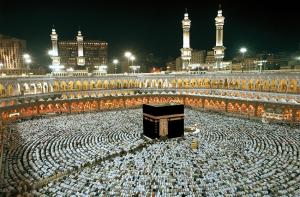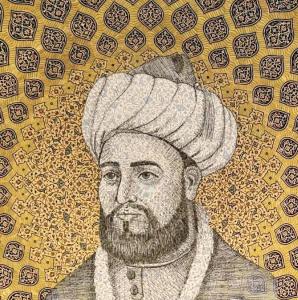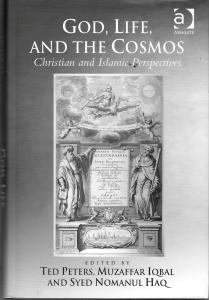Islam on the Trinity? Trinity 3

Islam on the Trinity? Are you kidding? The Muslim believer defends the oneness of God like a mother bear defends her cubs. From the Muslim’s point of view, the trinitarian Christian commits shirk, a form of blasphemy.[1]
Recall the Shahada, the Muslim profession of faith. “There is no god but Allah, and Muhammad is his prophet.” In championing God’s unity, Islam also champions God’s transcendent essence, an essence that lies beyond all attributes and even beyond what has been revealed to us about God. Islamic piety bows in humble reverence and total submission before Allah, the most sublime, the most majestic, the most awesome. God’s existence comes prior to our own existence; and it is the source of our existence. God is more real than we are. To deny God’s existence would be blasphemous.
God is One and only One!
The same applies to the oneness of God. If a Muslim were inclined to join a theological club, it would be monotheism. Divine oneness is decisive. This means every polytheism or even sympathy with polytheism would be eschewed. “Choose not two gods. There is only One God. So of Me, Me only, be in awe” (Qur’an 16:51). To even entertain suggestions that any being could receive even a share of our worship would be to commit shirk. God has no partners (Peters, God–The World’s Future, 219-228).
A monotheist would like belonging to a club where Plato (427-328 BCE) is a member. According to philosopher Plato, God is simple. God is “perfectly simple and true both in word and deed; he changes not; he receives not” (Plato, Republic II:382). For a simple God, go to Plato. Not the Bible. In the Bible, the God of Israel is complex, dynamic, and interactive. From a Muslim perspective, biblical Christians appear to commit shirk.
The opposite of shirk is Tawhid. Tawhid is the activity of asserting or affirming the unity of God, of Allah. The very activity of asserting God’s oneness disposes the Muslim to live in proper relationship to God.
Islam on the Trinity

How might this apply to trinitarian Christians? From the point of view of the Muslim, the Christian looks like a tri-theist, a polytheist, a denier of Tawhid.
The Qur’an objects to the family symbolism in Christian language, because it suggests plurality within the divine. “The triune God is analogous to a loving human family,” says Kenneth Samples at Reasons to Believe. But this is a no-no if you’re a Muslim. The idea of anything like human family relations within the divine life must be staved off. “Say: He is Allah, the One! Allah, the eternally Besought of all! He begetteth not nor was begotten. And there is none comparable unto Him” (Qur’an 112).
Badru D. Kateregga comments…
“Islam makes clear that God has no son, no father, brother, sister, wife, or daughters. The pre-Islamic idea of calling goddesses daughters of Allah was condemned by the Prophet” (Kateregga and Shenk 1997, 22).
Here is the definitive passage, wherein the Christian doctrine of the Trinity is denounced.
“The Messiah, Jesus son of Mary, was only the Messenger of God, and His Word that He committed to Mary, and a Spirit from Him. So have faith in God and His messengers, and do not say ‘Three’. Refrain, better it is for you. God is only One God” (Qur’an 4:171).
What could this mean?

Just what might the Qur’an be saying here? What Trinity is being rejected here? Is it the Trinity of Father, Son, and Holy Spirit? Not exactly. The Qur’an seems to assume that the Christian Trinity consists of God, Jesus, and Mary. “And when God said, ‘O Jesus son of Mary, didst thou say unto men, ‘Take me and my mother as gods, apart from God’?’ He said, ‘To Thee be glory! It is not mine to say what I have no right to’” (Qur’an 5:116). What is being rejected here is a Trinity of God, Mary, and Jesus. Not the Trinity of Father, Son, and Holy Spirit. How could such a colossal misunderstanding of Christian teaching arise?
How might such a colossal boo boo have arisen in Christian-Muslim relations? Let me speculate. Given that the Qur’an appeared in the late seventh century in the part of the world where Eastern Christianity was widely known, perhaps the new religion was reacting against Mary understood as theotokos or “Mother of God.” Could it have been Mariology that prompted this anti-trinitarianism?[2][3]

If so, then the Qur’an misunderstands Christian theology, even though popular Christian piety may have been understandingly perceived as depicting the Trinity as Father, Son, and Mary. Be that as it may, this is my historical speculation. The theological agenda regarding divine oneness and the Trinity remains.

Let’s ask an expert on Muslim-Christian relations, Mark Swanson. Swanson observes that “this misunderstanding mattered little. Later Muslim thinkers were equally mystified and offended by more technically correct expositions of the Christian Trinity” (Swanson 2005, 257). At best, Muslims find Christian trinitarian theology confusing. At worst, tri-theism. “The Christians have followed a procedure which has obliged them to proclaim the existence, conceptually and objectively, of three Gods,” writes al-Ghazali (Al-Ghazali 1990, 187). By violating divine oneness when imputing threeness, Christians are guilty of shirk (Peters, God–The World’s Future, 219-228).
Two Muslim videos treat Islam on the Trinity
Abdul A. Abdul at Bayero University Kano in Nigeria takes glee in thinking that Christians themselves want to throw the Trinity out of the Bible.
Nabeel Qureshi at the Summit Lecture Series presents, “A Muslim Makes Sense of the Trinity.” Listen to for the word, “complex.”
Conclusion
Would mutli-religious dialogue between Christians and Muslims be hopeless? Certainly not. Trinitarian Christians affirm the oneness of God just as Muslims do. “The Oneness of God must govern all other Christian doctrinal teaching,” declares Episcopal theologian Katherine Sonderegger (Sonderegger 2020, 2:423). The difference in divine unicity is that for Islam God is simply one, whereas for Christianity God’s unity is complex. The one God is a living God with an eternal internal perichoresis.
Roman Catholics at the Second Vatican Council (1962-1965) could say they hold Muslims “with esteem. They adore one God, living and enduring, merciful and all-powerful, Maker of heaven and earth” (Vatican, Nostra Aetate 1965, §3). Catholics and Muslims can both find internal to their respective theological visions an apprehension of the single sublime mystery. Theologians within Christianity and Islam can speak with one another directly, once they realize they both frame our understanding with the oneness of God.
Patheos ST 2019 Islam on the Trinity? Trinity 3
ST 2017 What is the Trinity? Part 1
ST 2018 What is Rahner’s Rule? Part 2
ST 2019 Islam on the Trinity? Part 3
▓

For Patheos, Ted Peters posts articles and notices in the field of Public Theology. He is a Lutheran pastor and emeritus professor at the Graduate Theological Union. He co-edits the journal, Theology and Science, with Robert John Russell on behalf of the Center for Theology and the Natural Sciences, in Berkeley, California, USA. His single volume systematic theology, God—The World’s Future, is now in the 3rd edition. He has also authored God as Trinity plus Sin: Radical Evil in Soul and Society as well as Sin Boldly: Justifying Faith for Fragile and Broken Souls. Along with Muzaffar Iqbal and Syed Nomanul Haq, he edited God, Life, and the Cosmos: Christian and Islamic Perspectives. See his website: TedsTimelyTake.com.
▓
Notes
[1] “Both Jewish and Muslim critics emphasize that the New Testament continues the Old Testament emphasis on the oneness of God, and they sometimes criticize trinitarianism as simple tritheism.” Thus speaketh the Stanford Encyclopedia of Philosophy.[2] The blasphemous idea of Christians worshipping three gods comes from a wrong understanding of the Trinity. In the fifth century AD there was a Christian cult called Maryanya which spread the false belief that Jesus and his mother Mary would be two separate gods besides God. The Quran was right to speak out against such impiety. This according to Arabic Bible Outreach Ministry.
[3] Orthodoxy. Community. Hierarchy. Family. Here is Nonna Verna Harrison. “A Trinitarian model for human community, rightly understood, provides a strong foundation for a feminist vision of the ideal human society. God the Father, who shares all he is with the Son and the Spirit and receives their gifts in return, who uses hierarchy to establish equality, provides a good model for human parenthood and all human leadership” (Harrison 2011, 528). Shirk or Tawhid?
References
Al-Ghazali. 1990. “The Elegant Refutation.” In Judaism, christianity, and Islam: The Classical Texts and Their Interpretation, by ed. F.E. Peters, 1080-1090. Princeton: Princeton University Press.
Harrison, Nonna Verna, 2011. “The Trinity and Feminism.” The Oxford Handbook of the Trinity. Eds. Gilles Emery and Matthew Levering. Oxford: Oxford University Press, 519-530.
Kateregga, Badru, and and David Shenk. 1997. A Muslim and a Christian in Dialogue. Scottdale PA: Herald Press.
Kolb, Robert and Timothy Wengert, eds. 2000. The Book of Concord. Minneapolis MN: Fortress.
LaCugna, Catherina Mowry. 1991. God For Us. New York: Harper.
Largen, Kristin. 2021. “Plurality and Salvation: Possibilities in Pannenberg’s Soteriology for Comparative Theology.” In The Enduring Promise of Wolfhart Pannenberg, by ed Andrew Hollingsworth, 183-200. Lanham MA: Lexington.
Moltmann, Jűrgen. 1974. The Crucified God. New York: Harper.
Pannenberg, Wolfhart. 1991. An Introduction to Systematic Theology. Grand Rapids MI: Wm. B. Eerdmans.
—. 1991-1998. Systematic Theology, 3 Volumes. Grand Rapids MI: Wm B Eerdmans.
Peters, Ted. 1993. God as Trinity. Louisville KY: Westminster John Knox.
—. 2015. God–The World’s Future: Systematic Theology for a New Era. 3rd. Minneapolis MN: Fortress Press.
Peters, Ted; Muzaffar Iqbal; and Syed Nomenul Haq, eds., 2005. God, Life, and the Cosmos: Christian and Islamic Perspectives. London: Routledge (Ashgate).
Plato, 375 BC. Republic.
Rahner, Karl. 1978. Foundations of the Christian Faith. New York: Seabury Crossroad.
—. 1997. The Trinity. New York: Herder.
Sonderegger, Katherine, 2015, 2020. Systematic Theology. Two Volumes: Minneapolis MN: Fortress.
Swanson, Mark. 2005. “The Trinity in Christian-Muslim Conversation”.” Dialog 44:3 250-260.
Vatican. 2003. “Catechism of the Catholic Church.” https://www.vatican.va/archive/ENG0015/__PX.HTM.
Vatican. 1965. “Nostra Aetate.” https://www.vatican.va/archive/hist_councils/ii_vatican_council/documents/vat-ii_decl_19651028_nostra-aetate_en.html.














